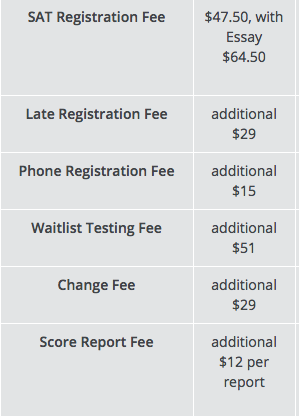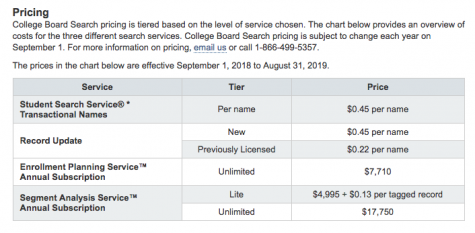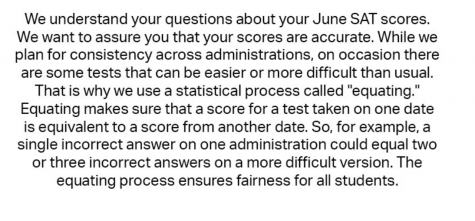The College Board’s Monopoly on Education
September 17, 2018
Ambitious high school students who aspire to attend one of 5,300 colleges in the United States take the SAT in order to be accepted. Almost 5 million students take this test every year. Recently, the College Board, the administrator of the SAT and AP, has been under fire for scandals and controversy for 2018 tests.
Collegeboard.org states, “The College Board is a mission-driven not-for-profit organization that connects students to college success and opportunity. Founded in 1900, the College Board was created to expand access to higher education. Today, the membership association is made up of over 6,000 of the world’s leading educational institutions.”
According to 990 tax forms, a not-for-profit (nonprofit) organization has to meet these requirements: “An organization that normally receives (1) more than 33 1/3% of its support from contributions, membership fees, and gross receipts from activities related to its exempt functions-subject to certain exceptions, and (2) no more than 33 1/3% of its support from gross investment income and unrelated business taxable income from businesses acquired by the organization after June 30, 1975.”
The College Board is a self-funded nonprofit, meaning they have revenue coming in from the fees they charge from their exams. They have an enormous revenue stream (in the billions) because every student that aspires to go to college has to take the SAT unless the ACT is offered. College Board also is the sole provider of AP Tests, a test that will give the student a certain amount of college credit hours if they pass.
The main reason students take AP classes in high school is to get college credit, yet the college board markets the test for students who are well-off financially. The average honor student takes 2 AP classes a year, and if they choose to take the test, they’ll be spending almost $800 in their high school career.
To most students, the costs of these tests are ridiculously overpriced, AP Tests have a flat rate of $94 per test. The SAT has multiple fees that can be tacked on:

However, only a small portion of these costs go to making the test, paying proctors, and ensuring a good testing experience. The remaining $98 million of their profit pays College Board officials, where the CEO makes $1.3 million and executives make around $350,000 a year.
The College Board also makes money off of the students that take their tests by selling their profiles to colleges.

Obviously, College Board isn’t putting this money into good use to make new tests, since the October international SAT from 2017 was reused as the August 2018 SAT. This sparked controversy, as the test answers were leaked online and many students cheated. A class-action lawsuit was just filed in U.S. District Court in Florida by the father of a student who took the SAT on Aug. 25. This means that if the Florida court wins, anyone who took the August 2018 SAT could get compensation.
However, there are many other controversies surrounding the SAT, including cheating and illegal test prep centers in Asia. Earlier this year, #rescoreJuneSAT gained momentum on Twitter after students were getting significantly lower scores than they should have. The College Board released a statement about the topic:

On the contrary, the ACT offers an exam for college readiness and a program similar to AP, called International Baccalaureate (IB). However, AP is offered in almost 20,000 high schools across America, and IB is offered in about ⅓ that amount.
The SAT says that their test is fair for all students regardless of the rigor of their classes or opportunities in high school. Some colleges don’t agree with this and made standardized tests optional during the application process. A test-optional policy leaves the decision up to you as to whether or not you want to send SAT scores to a school. In other words, SAT-optional colleges do not require you to send your scores. Instead, you must decide whether or not your test results are an accurate representation of your academic ability and potential.
While a test-flexible policy requires you to send test scores, it might allow for different options in place of the SAT. For example, some schools might waive their test requirements if you meet a minimum GPA or are applying to a specific program, while others might let you send AP scores or SAT Subject Test scores in lieu of general SAT scores.
For example, NYU is a test-flexible school. Here are their requirements:

A few schools in Georgia de-emphasize SAT, including Agnes Scott College, Brenau University, Point University, and Georgia Gwinnett College. Yet, most schools rely heavily on students SAT scores, and a majority want the student to include the essay and SAT Subject Tests, which test a specific area of study in one test.
Most students, parents, and teachers that support the de-emphasis of the SAT also agree that this organization is running a monopoly. A monopoly, basically, is when one group or organization controls the majority of a particular service. In the College Board’s case, they run a monopoly on higher education. They increase prices and add-on fees to a ridiculous level when they are aware most students need this test to get into college. College Board’s standards are dubious at best, and students should raise concerns over these unfair practices.








